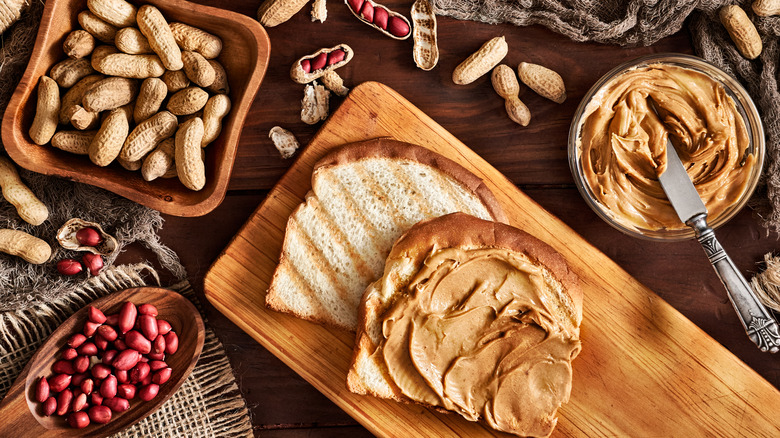The Unexpected Effect Eating Peanut Butter Can Have On Your Stress Levels
There are a lot of different reasons why you crave peanut butter sometimes. For starters, it tastes so good; the rich and nutty, creamy, or crunchy goodness of this particular nut butter is hard to beat. Probably, this is why it's a pantry staple in a lot of households across the world. (Did you know there's even an official world record for the most amount of PB and J sandwiches eaten in a minute?)
But if you're someone who looks to the sweet treat slathered on apples or spread on whole-grain toast as a sort of comfort food, you might be on to something. Turns out, peanut butter is great when it comes to stress relief.
According to a 2021 randomized control trial published in Clinical Nutrition, which involved 63 healthy young adult participants and lasted from November 2019 to June 2020, consuming small amounts of peanut butter daily at any time of day, was shown to improve cognitive function and stress levels. This is not the first time peanut butter's mental and cognitive health merits have been analyzed in studies. Researchers believe peanut butter contains quite a few ingredients that have an effect on these areas, namely niacin, vitamin E, resveratrol, and p-coumaric acid. It's why loading up on peanut butter for brain health is encouraged. When it comes to its unexpected effect on stress, p-coumaric acid, in particular, was shown to be a factor, according to the 2021 study.
How does peanut butter reduce stress levels exactly?
P-coumaric acid is an antioxidant found in peanut butter that could influence mood-regulating neurotransmitters in your brain. In fact, per a 2014 study published in Phytotherapy Research, oral administration of p-coumaric acid to mice seemed to have similar effects to that of oral diazepam, an FDA-approved medication for the management of anxiety disorders. It is thought that p-coumaric acid could have an unexpected effect on the gamma-aminobutyric acid (GABA) receptor in your brain — the part of your brain involved in calming your nervous system.
In addition to p-coumaric acid, peanut butter contains beta-sitosterol (SIT), a plant chemical (phytosterol) that's been known to reduce anxiety levels. In a 2021 study published in Cell Reports Medicine done on mice, beta-sitosterol was shown to reduce the effects of restraint-related stress and contextual fear memory. Additionally, phytosterols have also been linked with reducing the intestinal absorption of cholesterol, promoting heart health, and protection against cancer.
Another ingredient in peanut butter that could influence your stress levels is tryptophan. Recall how tryptophan-rich turkey dinners put you in such a relaxed and sleepy mood? Peanut butter could have the same merits. Your body needs tryptophan to make the mood-boosting hormone serotonin. Does this mean you should be turning to peanut butter whenever you feel stressed?
Consuming peanut butter for stress: Things to consider
It's probably not a good idea to think of consuming too much peanut butter whenever you're stressed. Although this nut butter is known for its heart-healthy fats — monounsaturated fatty acids and polyunsaturated fatty acids — and can help you feel full for longer thanks to its protein and fiber content, it still contains some amount of saturated fat. Saturated fat, consumed in excess, can cause bad cholesterol buildup and harm your cardiovascular health.
Plus, prudent consumption of this tasty treat also means scouring the aisles for the healthiest brands of peanut butter you can eat. If the ingredient list is long and complicated, you're better off putting that jar back on the shelf. Looking for just peanuts and a small amount of salt is a good way to go. Additives like sugar, too much sodium, and oils are what you want to avoid.
If you're wondering how much of it you can safely have, two tablespoons of the stuff is what's generally recommended by dietitians. Combining this with other healthy foods like whole-grain toast, fiber-rich fruits, and Greek yogurt is always a good way to go. But be aware that peanut allergies are a thing too. If you have any indications of an allergic reaction, like hives, itchy throat and mouth, digestive problems, or shortness of breath, you'll know not to touch the stuff. Stress is an unexpected side effect of everyday life. Consuming foods that help with that is one piece of the puzzle. Mindfulness, exercise, and adequate sleep are other things that matter.


